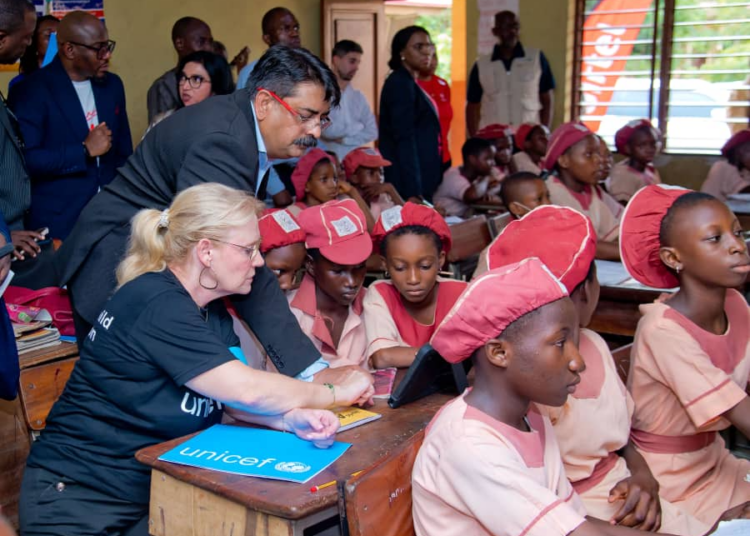The United Nations Children’s Fund (UNICEF) in collaboration with Airtel Africa, and the Ministry of Education, has reached a major milestone in its digital education initiative, impacting 600,000 learners across 1,260 schools in Nigeria.
Airtel Africa CEO Sunil Taldar, who disclosed this at a visit to St. Agnes Primary School, Lagos, on Tuesday, emphasized the importance of the partnership in bridging the digital divide.
“Education is critical for Africa’s future, with 40 percent of the population below 16 years. Our work with UNICEF ensures standardized digital learning through the Nigeria Learning Passport, providing connectivity and devices to students and teachers,” he said.
UNICEF Nigeria’s chief field officer, Celine Lafoucriere, highlighted the program’s sustainability, noting that technical support ensures continued access to digital learning tools.
According to Lafoucriere, the initiative is not only about providing digital tools but also about ensuring sustainable learning outcomes. She noted that Lagos State had already implemented a digital education project, leveraging technology to deploy teaching and learning content.
This partnership builds on that foundation by offering internet connectivity to primary schools, allowing students to access educational resources while also enhancing teachers’ ability to deliver lessons effectively, she affirmed.
Speaking on the sustainability of the initiative, Lafoucriere emphasized that digital gadgets are not permanent and require maintenance, repairs, and eventual replacement. She highlighted the need for timely intervention to ensure the continuous functionality of these devices. “For digital education to continue, you just have to repair and replace at the right time. By addressing these sustainability challenges, the initiative ensures that both students and teachers remain engaged in a participatory learning process, ultimately fostering better educational outcomes,” she stated.
Regarding the progress of the partnership, Lafoucriere revealed that since its inception, 1,260 schools have been connected to the internet, with 1.8 million learners now registered on the Nigeria Learning Passport, while stressing the importance of connectivity in minimizing disruptions to education and ensuring standardized quality learning. “We noticed that there are some technical glitches, and these visits are made to address them,” she explained.
Beyond digital education, Lafoucriere reiterated UNICEF’s broader mission of working with governments to improve access to essential services such as water, sanitation, healthcare, and nutrition. “Education is a very important point because, without it, even if basic services are available, one cannot secure a decent livelihood,” she said. She particularly emphasized UNICEF’s focus on supporting the most vulnerable children, including girls, to ensure inclusive and equitable education. The integration of digital learning, she added, is crucial in achieving this goal.
Echoing this sentiment, the Lagos state commissioner for Basic and Secondary Education, Mr. Jamiu Tolani Alli-Balogun, underscored the importance of embracing digital learning in today’s competitive world. “We know we’re in a digital world, and we cannot be isolated from global competitiveness,” he said.
He clarified that Lagos state already had a digital education strategy in place, adding that this partnership with UNICEF and Airtel serves to strengthen it.
Stressing sustainability, he pointed out that maintaining and replacing digital tools as needed is essential for the continued success of the initiative. “It brings a participatory outcome—the students are engaged, and so are the teachers. It is a collaboration that allows both students and teachers to achieve their primary objective of teaching and learning,” he stressed.





